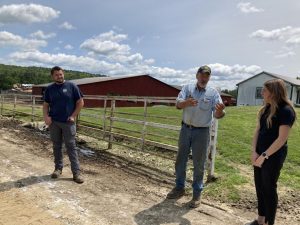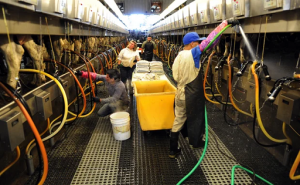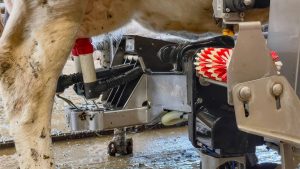
Proponents say this bill would streamline citizenship for migrant visa workers and lower food prices, but opponents say this is an extreme amnesty bill.
Wisconsin’s agricultural industry generates over 104 billion dollars a year. Nearly half of that, 45 billion, comes from the dairy industry and a worker shortage is threatening America’s Dairyland.
“Farmers are being forced to go out of business because they don’t have the help they need on the farm,” said Mykel Bickham, Associate Director of Government Affairs with Edge Dairy Farmer Cooperative.
So dairy farmers are calling on the Senate to pass the Farm Workforce Modernization Act allowing them to hire H-2a visa workers. Proponents like Bickham said would keep dairy production consistent and lessen the pressure on consumer wallets.
“It has a huge impact on your grocery store shelves. It also has an impact on inflation,” said Bickham.
The problem is the dairy industry is excluded from the H-2a visa program and dairy farmers say this is hurting their business.
“Getting people to fill different positions, whether we’re talking milking cows or feeding animals. I think is a huge issue,” said Dan Wegmueller with Wegmueller Dairy Farm & “The Dairy” Farm Stay.”
“As input costs continue to go up and it’s tougher for farmers to get their products out onto the market and harvested. Those prices do go up on the grocery store shelves,” Bickham said.
A Texas A&M study links more H-2A workers with lower inflation and consumer prices.
Some key findings of that report:
- More migrant and H-2A workers are associated with lower inflation
- More denied naturalization petitions are associated with larger consumer prices and higher
Opponents like Daren Bakst, an expert with the Heritage Foundation, described the Farm Workforce Modernization Act as an amnesty bill for illegal workers with short-term benefits for farmers. He said workers who get this H-2A visa will almost certainly move off the farm. In his full statement, Bakst said:
“This is an amnesty bill for agricultural workers who are illegally in the country. And the bill makes no pretense otherwise. The legislation gives a special pathway to citizenship for illegal workers, with some workers being able to get a green card in as little as four years. To stress, it isn’t giving these illegal workers a way to become a part of the H-2A guest worker program, but instead, it goes way beyond that and creates a pathway to citizenship. It allows illegal aliens to stay in the country while they are provided an easy pathway to citizenship, rewarding lawbreakers and punishing legal aliens who abide by the rules to become citizens.
For those saying it will help farmers, at best it would provide a short-term benefit to farmers who have employed illegal workers. Many of the illegal agricultural workers who get this new pathway will almost certainly move off the farm. That movement away from the farm is precisely what happened when the United States granted amnesty to more than 1 million agricultural workers in 1986.
It’s one thing for Congress to reform legal pathways, but it’s quite another to reward illegal agricultural workers and agricultural employers who have ignored the law altogether.
When considering immigration in agriculture, it isn’t a binary choice between doing nothing and creating this extreme amnesty bill. There should be a thoughtful dialogue regarding how to improve the legal immigration system without simultaneously undermining its legitimacy.”
The Farm Workforce Modernization Act is still pending in the U.S. Senate; whether or not the Senate will vote on this act remains uncertain.
This act would cap worker visas at 20,000 and dairy farmers want that cap lifted, which is one reason this act is stalled.























